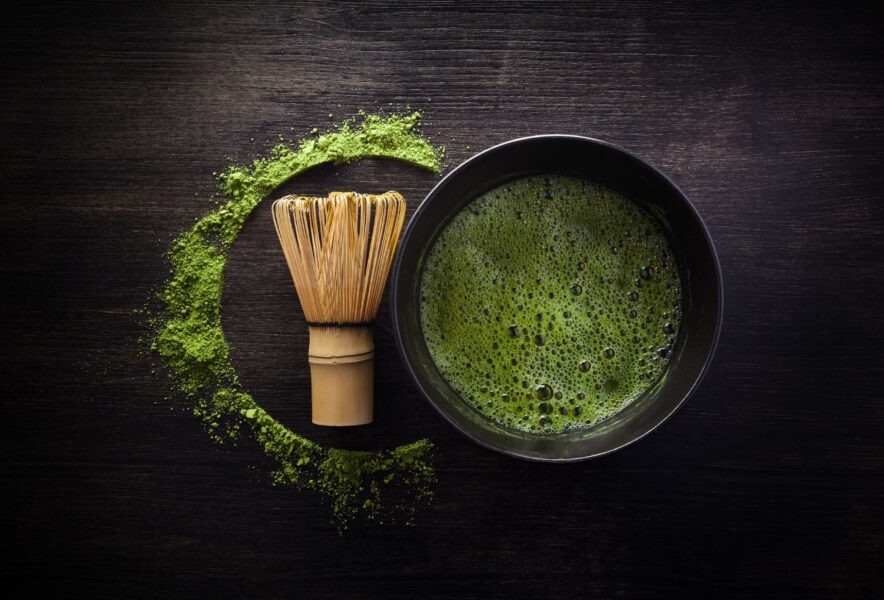- What is Matcha? An Introduction to Japan’s Ceremonial Green Tea
- The Health Benefits of Matcha: Why It’s Considered a Superfood
- Traditional and Modern Ways to Enjoy Matcha: Tea, Sweets, and More
- Where to Buy and Enjoy Matcha in Tokyo: From Specialty Shops to Cafés
- Matcha in Japanese Culture: A Tradition Rooted in Zen Buddhism
What is Matcha? An Introduction to Japan’s Ceremonial Green Tea
Matcha is a finely ground green tea powder made from specially grown and processed tea leaves. Known for its vibrant green color, matcha is most famous for its use in traditional Japanese tea ceremonies. The tea leaves used for matcha are grown under shade, which enhances their nutrient content, and are then ground into a fine powder. When prepared, matcha is whisked with hot water using a bamboo whisk, creating a frothy, rich tea with a deep, earthy flavor.
Matcha’s origins can be traced back to Zen Buddhist monks, who valued it for its calming and focusing effects during meditation. Today, matcha is enjoyed not only in tea ceremonies but also in a wide range of drinks and sweets, both traditional and modern.
The Health Benefits of Matcha: Why It’s Considered a Superfood
Matcha is considered a superfood due to its high concentration of antioxidants, particularly catechins, which are known to boost the immune system and reduce inflammation. One of the most notable benefits of matcha is its ability to provide calm, focused energy. Unlike coffee, matcha contains L-theanine, an amino acid that promotes relaxation without causing drowsiness. It also contains a moderate amount of caffeine, which, when combined with L-theanine, leads to a balanced and sustained boost of energy.
Other health benefits include improving brain function, supporting heart health, and aiding in weight loss. Drinking matcha regularly can help improve overall well-being, making it a favorite choice among health-conscious individuals.
Traditional and Modern Ways to Enjoy Matcha: Tea, Sweets, and More
There are many ways to enjoy matcha, from traditional preparations to modern adaptations. Here are a few popular options:
- Matcha Latte: A creamy blend of matcha and milk, often sweetened. This has become a staple in cafés around the world, offering a delicious and comforting way to enjoy matcha.
- Matcha Sweets: Matcha is a popular flavor in Japanese desserts, such as matcha ice cream, matcha cakes, and matcha chocolates. In Tokyo, many cafés and patisseries serve stylish matcha-based sweets that appeal to both locals and tourists.
- Traditional Matcha: For a more authentic experience, you can enjoy matcha in its traditional form at a tea ceremony. Tokyo has several places where you can participate in a tea ceremony and learn how to properly prepare and appreciate matcha in a quiet, meditative setting.
Where to Buy and Enjoy Matcha in Tokyo: From Specialty Shops to Cafés
In Tokyo, you can easily find matcha in supermarkets and convenience stores, where it’s sold in tea bags, powder form, or as snacks and sweets. Matcha-flavored snacks like cookies, chocolate, and cakes are widely available and make for great gifts or souvenirs.
For a more refined matcha experience, visit one of Tokyo’s many matcha specialty shops or cafés. From traditional tea houses to trendy spots serving matcha lattes and parfaits, there’s no shortage of places to enjoy this iconic green tea. Many cafés in Tokyo offer beautifully presented matcha drinks, often accompanied by intricate matcha-flavored desserts, making it a popular choice for those seeking an Instagram-worthy experience.
Matcha in Japanese Culture: A Tradition Rooted in Zen Buddhism
Matcha holds a special place in Japanese culture, especially within the practices of Zen Buddhism and the art of tea ceremony. Zen monks have long used matcha as a way to enhance their meditation sessions, as its calming yet focusing effects help create a peaceful mindset. The Japanese tea ceremony (called chanoyu) is a highly ritualized practice in which matcha is carefully prepared, served, and consumed, reflecting the beauty of simplicity and mindfulness.
While matcha has evolved into a trendy flavor in modern Japan, its deep cultural roots remain significant. Participating in a tea ceremony or enjoying a bowl of traditional matcha allows people to connect with this rich cultural heritage.

Comment